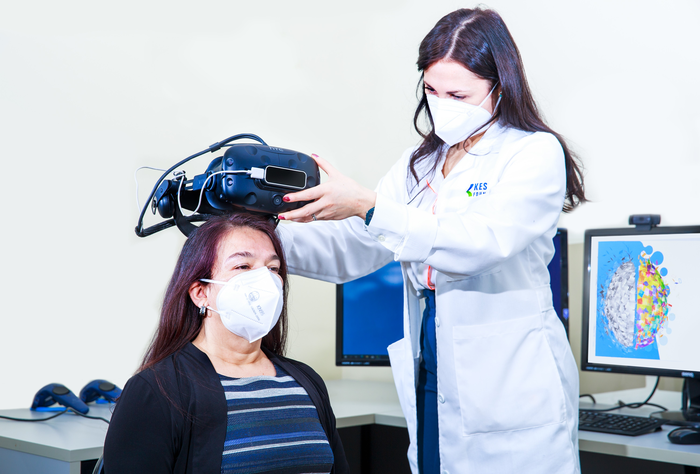Researchers describe the development of a user-centered virtual reality system using head-mounted display and hand-tracking technology to engage stroke survivors with spatial neglect in intensive, repetitive therapy
East Hanover, NJ. February 11, 2022. Kessler Foundation experts in stroke rehabilitation proposed a new paradigm for improving treatment of spatial neglect, a disabling condition that hinders recovery for at least 30 percent of stroke survivors. They outlined their approach in their recent article, “Immersive virtual reality treatment for spatial neglect: An agile user-centered development process,” (DOI: 10.1016/j.rehab.2021.101592), published online on November 15, 2021, by the Annals of Physical Medicine & Rehabilitation. Authors are Peii Chen, PhD, senior research scientist in the Center for Stroke Rehabilitation Research, and Denise Krch, PhD, senior research scientist in the Center for Traumatic Brain Injury Research.

IMAGE: RESEARCHERS DEMONSTRATE THE TECHNOLOGY USED DURING KESSLER FOUNDATION SPATIAL RE-TRAINING THERAPY (KF-SRT™). CREDIT: KESSLER FOUNDATION
Spatial neglect impairs the neural networks supporting spatial attention and related cognitive and motor functions. People experience altered spatial orientation, which can cause problems with balance and navigation, as well as with memory, reading, and other cognitive processes. While progress has been made in detecting post-stroke spatial neglect, treatment strategies have lagged. To address the need for effective neurorehabilitation, the authors developed a treatment approach based on immersive virtual reality (VR), which allows standardized delivery of intensive, repetitive therapy in a flexible, engaging environment.
To develop the Kessler Foundation Spatial Re-Training Therapy (KF-SRT™), which employs a head-mounted display and hand-tracking technology, the Foundation team worked closely with Virtualware, an award-winning VR technology company based in Spain. “During user testing, we were able to communicate the need for revisions to Virtualware and adapt the software according to feedback from therapists and patients,” said Dr. Chen. “The resultant system has a user interface that accommodates creation of a patient profile, a calibration module, a choice of four game-like treatment modules, and a spreadsheet for data collection and export, enabling therapists to review progress across sessions.”
In the virtual treatment environments, patients wear a head-mounted display and hand-tracking technology to engage in a variety of challenging motor tasks. “The scoring algorithm rewards correct responses, with higher scores awarded for tasks completed successfully in the neglected space,” explained Dr. Krch.
The team reported that therapists were unanimously satisfied with the KF-SRT user interface, and patients preferred the VR experience to conventional therapy. “The next step is to conduct pilot studies of feasibility, limitations, and preliminary efficacy,” they concluded, “while continuing to update the system’s software and technology. This will position VR technology in the forefront of options for rehabilitating individuals with spatial neglect.”
Funding sources: National Institute on Disability, Independent Living, and Rehabilitation Research (NIDILRR; grant number no. 90IFDV0001).
For information on ongoing rehabilitation research studies at Kessler Foundation, contact: ResearchStudies@KesslerFoundation.org.












